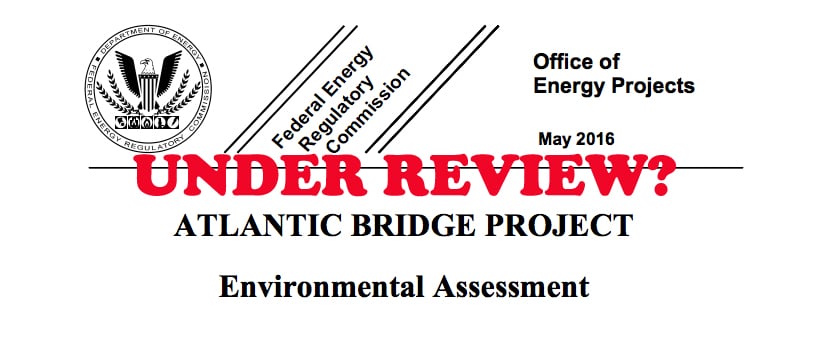Two US Senators have demanded the Federal Energy Regulatory Commission (FERC) cancel the environmental assessment of a natural gas project after DeSmog revealed a potential conflict of interest in the process.
In their letter, Massachusetts Democratic Senators Elizabeth Warren and Ed Markey urged FERC to conduct a new and objective review into Spectra Energy’s Atlantic Bridge project.
Residents and activists outraged about the potential impacts of the project had flooded both Warren’s and Markey’s offices with requests for intervention.
Writing to FERC Chairperson Norman Bay, Sens. Warren and Markey cite DeSmog’s findings at length and express serious concern over the integrity of Atlantic Bridge’s environmental assessment.
The Senators state that “this new information raises serious questions about the accuracy and objectivity” of the environmental assessment (EA).
The Atlantic Bridge project aims to expand Spectra’s existing Algonquin Gas Transmission Pipeline, which carries fracked gas from Pennsylvania to New York and New England.
Natural Resource Group
Natural Resource Group (NRG), a third-party contractor hired by FERC and funded by Spectra, carried out the original EA.
Yet when FERC approved the hiring of NRG, it was already working directly for PennEast Pipeline LLC, a gas consortium of which Spectra is a part.
PennEast plans to build a new pipeline from the Marcellus Shale that will connect to the Algonquin Gas Transmission Pipeline.
As the Senators’ letter outlines, FERC had hired a contractor to work on the environmental review that had an apparent financial stake in Spectra’s Atlantic Bridge project.
Warren and Markey write that, by FERC‘s own standards, “this relationship appears to constitute a conflict of interest.“ They added, “[we are] concerned that FERC nevertheless agreed to let NRG work on the environmental review.”
The Senators demanded answers from FERC on whether NRG disclosed its relationship with Spectra, and if FERC considered if this relationship would create a conflict of interest.
Lastly, they urged FERC to cancel the EA and instead issue a more comprehensive Environmental Impact Statement (EIS), “making sure that any third-party contractor used by FERC is free from any ties to industry that could create a conflict of interest or call its objectivity into question.”
When asked for comment, the Federal Energy Regulatory Commission told DeSmog, ”FERC does not respond to letters from members of Congress via the media. Chairman Bay will respond to the Senators.”
DeSmog has approached Spectra and NRG for comment as well.
Read the DeSmog article that inspired the Senators’ letter – Revealed: Contractors Hired by FERC to Review a New Spectra Energy Pipeline Work for Spectra on a Related Project
More NRG Revelations
More details about NRG’s strong ties to the oil and gas industry have also come to light.
In a 2012 statement to a Minnesota business-related publication, NRG President Mark Larson lauded his company’s public affairs arm which “works both to satisfy regulatory requirements and earn public acceptance for energy projects.”
According to Larson, “this group works ‘hand-in-glove’ with the other groups at NRG to ensure that their clients’ projects are approved and their projects get to market on schedule.”
Since 2013, NRG has also been a fee-paying member of the Marcellus Shale Coalition (MSC), a powerful trade group advancing the interests of fossil fuel companies operating in Pennsylvania’s Marcellus Shale region. NRG is currently represented in the MSC through its new parent company, Environmental Resources Management (ERM).
ERM has long standing ties to the MSC. MSC’s former founding CEO, Kathryn Klaber, previously worked for ERM.
Patricia Kornick, an NRG employee who is providing public affairs services for PennEast, has also worked for the MSC in the past.
Kornick currently holds a prominent position as NRG’s representative to the MSC, heading its transmission workgroup.
The MSC recently sent a letter to FERC in strong support of the PennEast Pipeline, urging the Commission to approve the project. Given that the PennEast consortium is itself a member of the MSC, this is not surprising. But it does raise further questions about NRG’s objectivity in reviewing Spectra’s Atlantic Bridge, which will ultimately benefit from the approval of PennEast.
US Senate lobbying disclosure documents show that, in the past several years, the MSC has lobbied on issues such as “pipeline construction and endangered species.”
In other words, while FERC hired NRG to conduct supposedly independent environmental reviews of new energy projects, the NRG-funded MSC lobbied for industry-friendly legislation to loosen environmental regulations and oversight.
NRG also seems to have an especially close relationship with FERC itself. Government contract records show that since at least 2011, FERC has hired NRG to lead seminars for industry executives on FERC’s environmental review and compliance processes.
In a dedicated website promoted by FERC but maintained by NRG, companies are encouraged to register for the 3-day interactive seminar that “will describe how to successfully navigate the FERC environmental review process.” NRG received large sums of money for these seminars.
Last year security personnel at a seminar removed anti-fracking activists with the group Beyond Extreme Energy.
In 2014 Kevin O’Connor, NRG’s vice president for public affairs, authored an article in a natural gas trade journal, sharing tips on how his company garners support for its clients’ energy projects.
O’Connor warned the industry that environmental activists nowadays “are willing to disable or chain themselves to construction equipment, conduct a tree-sitting protest, or climb the fence around the White House are beginning to fight climate-change battles at a local level.” Therefore, “companies need to get serious about involving elected officials early – and often. Fostering and creating a proactive approach can reduce their influence in developing hurdles and is a more efficient way to garner support for projects.”
According to O’Connor, NRG’s key to gaining the approval for projects is creating trust, which means “establishing relationships and developing credibility.” To overcome the “trust hurdle [that] exists with the general public before a project is announced,” public affairs specialists are required for “getting boots on the ground and developing and maintaining relationships with elected officials and the broader community.”
Subscribe to our newsletter
Stay up to date with DeSmog news and alerts







